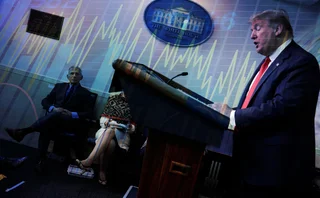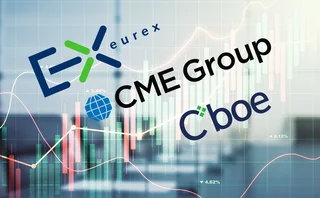
HFT firm Teza said to be eyeing prop trading retreat
Big US Treasury trader has seen hedge fund add $1.5bn this year

High-frequency trading (HFT) firm Teza Technologies is said to be reviewing the future of its proprietary trading business. The firm has at times been a top-three interdealer trader in the US Treasury market.
Chicago-based Teza was founded in 2009 by Misha Malyshev – formerly head of HFT at Citadel – and has offices in Austin, London and New York. Malyshev's firm combines high-frequency proprietary trading and asset management, and is said to be increasingly focusing on the latter.
Rumours about the firm began circulating in the past fortnight. It was not possible to get a clear picture of what is happening at Teza, with sources variously claiming the firm is considering a sale or closure of its proprietary trading arm, or weighing a retreat from the Treasury market specifically.
Teza is famously secretive, and no current employees would speak to Risk.net, but seven sources at hedge funds, proprietary traders and trading platforms all offered some version of the story, in some cases claiming the information came from insiders at the firm.
Malyshev did not respond to a request for comment. A spokesperson at Teza's PR firm, FTI Consulting, declined to comment.
The firm launched a hedge fund – called Teza Capital – in 2014. The fund pulled in just under $30 million from investors in 2014 and 2015, according to regulatory filings with the US Securities and Exchange Commission (SEC). Cash has been flowing into Teza's hedge fund this year, however. The firm has gathered over $1.5 billion from investors in the past eight months alone, the regulatory filings show – lending some credence to outsiders' claims that Teza could scale back its proprietary trading activities and focus on running investor capital.
The influx of cash comes despite tepid performance. Teza's hedge fund returned just 4% in 2015 and is down 6% year-to-date, according to a hedge fund industry source.
Teza has been one of the most prominent HFT firms in the US Treasury market. In May and June last year, the company ranked third behind Jump Trading and Citadel Securities on a list Risk.net obtained of the top 10 participants by volume on BrokerTec, the largest interdealer US Treasury trading platform. In those two months, the firm was responsible for 11% of the platform's volume.
Other firms will fill the gap if Teza leaves, predicts a senior executive at a US-based proprietary trading firm: "Teza leaving the US Treasury market will create space for others dying to get in. It's not like a firm exiting a business where there are only a handful of players."
The firm also trades listed derivatives and started quoting interest rate swap prices last year.
Cost pressures and declining revenues
In recent months, analysts have highlighted growing pressures facing HFT firms. The costs of running a HFT business are high, and the per-trade returns are low, says the senior executive: "HFT is a constant, never-ending reinvestment into a very low-margin, pennies-per-trade business."
A Deutsche Bank research note in May this year stated that revenues from HFT firms in the US had declined from more than $7 billion per year in 2009 to around $1.3 billion in 2014, and questioned whether HFT strategies had reached their peak, citing the snowballing cost of infrastructure and increased competition as obstacles to revenue growth.
"The bottom line is that HFTs have come under pressure on both the revenue and the cost front. Unsurprisingly, then, even though a lack of available data prevents a comparison of the number of competing HFT firms over time, data for the US shows that the average profit per share traded has halved, from a tenth of a penny in 2009 to a twentieth of a penny in 2015," wrote Orçun Kaya, economist at the German bank in Frankfurt.
In the rates markets, some firms have been trying to diversify. Global Trading Systems, KCG and Virtu Financial are among those offering bilateral US Treasury prices to banks, rather than quoting on multilateral platforms. Virtu revealed a deal to provide JP Morgan with technology and US Treasury market access in its second-quarter earnings. Credit Suisse signed a similar deal with HFT firm Tower Research Capital in 2014.
HFT firms also face more regulatory scrutiny. Massive intra-day swings in equity markets in May 2010 and in Treasury markets in October 2014 have been blamed in part on high-frequency traders, and also raised questions about how well watchdogs can monitor and supervise the sector.
The Commodity Futures Trading Commission proposed rules on November 24, 2015 that seek to impose risk controls on those firms that use automated trading strategies as well as allowing regulators to have access to trading firms' source code for algorithms.
In Europe, the upcoming revised Markets in Financial Instruments Directive (Mifid II) will impose speed bumps on those venues that cater to HFT strategies, as well as order-to-trade ratios to prevent the overuse of cancellations.
Only users who have a paid subscription or are part of a corporate subscription are able to print or copy content.
To access these options, along with all other subscription benefits, please contact info@risk.net or view our subscription options here: http://subscriptions.risk.net/subscribe
You are currently unable to print this content. Please contact info@risk.net to find out more.
You are currently unable to copy this content. Please contact info@risk.net to find out more.
Copyright Infopro Digital Limited. All rights reserved.
As outlined in our terms and conditions, https://www.infopro-digital.com/terms-and-conditions/subscriptions/ (point 2.4), printing is limited to a single copy.
If you would like to purchase additional rights please email info@risk.net
Copyright Infopro Digital Limited. All rights reserved.
You may share this content using our article tools. As outlined in our terms and conditions, https://www.infopro-digital.com/terms-and-conditions/subscriptions/ (clause 2.4), an Authorised User may only make one copy of the materials for their own personal use. You must also comply with the restrictions in clause 2.5.
If you would like to purchase additional rights please email info@risk.net
More on Markets
Review of 2024: as markets took a breather, firms switched focus
In the absence of major crises and rules deadlines, financial firms revamped strategy, services and practices
Cboe plans Q2 dispersion futures listing
Expectations of post-US-election uncertainty drives launch, and could help bank equity desks hedge OTC risks
Futures exchanges look to ride credit ETF wave
Proponents hope for increased buy-side trading, with three exchanges competing for market share
Doubts raised over new FX platform disclosures
New disclosure sheet template will require platforms to outline how they charge for data
Pimco and Vanguard slash FX forwards trading with BNP Paribas
Counterparty Radar: French bank sees its notional with mutual funds halve
Profit and pain as macro turmoil engulfs Brazil
FX options trades pay off, while sharp jump in rates caught traders by surprise
Repo and FX markets buck year-end crunch fears
Price spike concerns ease as September’s surprise SOFR jump led to early preparations for bank window dressing
US senators press CFTC on Japan swap clearing
Boozman and Hagerty urge action on yen swap clearing access to JSCC in letter to US regulator







